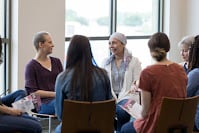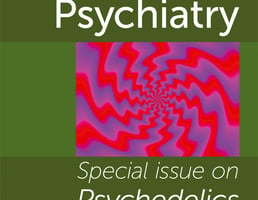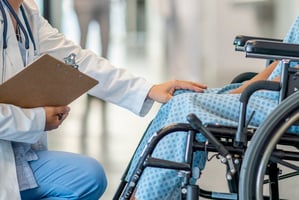Psilocybin Group Therapy May Reduce Depression in People With Cancer

Psychedelic-assisted psychotherapy is typically provided in a private setting involving one patient and two therapists. A small study described today in Cancer suggests a single session of psilocybin-assisted therapy delivered in a group setting can significantly reduce depressive symptoms in patients with cancer for up to eight weeks with minimal side effects.
“Approximately 25% to 33% of patients with cancer meet criteria for clinically significant depressive symptoms, which are associated with lower treatment adherence, reduced quality of life, and higher rates of mortality,” wrote Manish Agrawal, M.D., CEO and Co-founder of Sunstone Therapeutics in Rockville, Md., and colleagues. Partial funding for this trial was provided by Compass Pathways, and some of the authors of the Cancer report hold Compass Pathways stock.
For the open-label study, the researchers recruited adults with cancer and major depression. Adults with depression with psychotic features and/or suicidal thoughts were excluded, as were those who were taking antidepressants, antipsychotics, and/or medical cannabis. Participants who had curable and noncurable cancer were included in the study.
A total of 30 participants (average age 56 years, predominantly women) were divided into three- or four-person groups. All groups received the following:
- One two-hour individual therapy session, where participants got to know their assigned therapist, were educated about what to expect with psilocybin therapy, and coping strategies.
- One two-hour session the day before psilocybin treatment. This included a 45-minute individual session with the therapist to set an intention and a 75-minute group psychoeducation component.
- One psilocybin session (lasting 6 to 7 hours), during which participants in each group simultaneously received 25 mg of psilocybin while in individual rooms with their assigned therapist. The participants were separated by other participants in their group by sliding doors without soundproofing.
- Two two-hour posttreatment integration sessions separated by one week. These sessions included a 45-minute individual component and a 75-minute group component.
Participants’ average score on the Montgomery‐Åsberg Depression Rating Scale (MADRS) at the start of the study was 25.9, indicating moderate depression. Three weeks after psilocybin treatment, average MADRS scores dropped by over 19 points in the group, and this improvement was maintained 8 weeks after psilocybin administration.
Half of the participants no longer met DSM-5 criteria for major depression by week 8. The patients also self-reported significant improvements in their anxiety symptoms following psilocybin-assisted therapy.
Agrawal and colleagues noted that this novel protocol did not result in any serious adverse events in the participants. The most common treatment-related side effects were nausea and headache, which were generally mild and are known side effects of psilocybin.
“This innovative framework offers increased scalability and dissemination of psilocybin treatment in real‐world settings and alleviates the cost and time burdens of using two therapists for one patient,” Agrawal and colleagues wrote.
“If group‐based approaches can improve treatment outcomes and save costs compared to individually delivered psychedelic‐assisted therapy, they will be an important innovation to make these treatments more affordable to ensure that as many patients as possible can benefit from their healing potential,” wrote Johannes Thrul, Ph.D., of the Johns Hopkins Bloomberg School of Public Health and colleagues in an accompanying editorial. However, the “potential for participants within a group to influence one another beneficially or detrimentally” should be considered an important limitation when examining these results, they added.
To read more on this topic, see the Psychiatric News article “Depression Improves Following Single Dose of Psilocybin.”
(Image: Getty Images/iStock/SDI Productions)
Don't miss out! To learn about newly posted articles in Psychiatric News, please sign up here.






